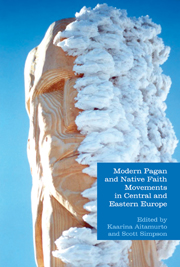Book contents
- Frontmatter
- Contents
- Contributors
- 1 Introduction: Modern Pagan and Native Faith Movements in Central and Eastern Europe
- Part I Overviews
- Part I Country Studies
- 6 Contemporary Paganism in Lithuanian Context: Principal Beliefs and Practices of Romuva
- 7 The Dievturi Movement in Latvia as Invention of Tradition
- 8 Polish Rodzimowierstwo: Strategies for (Re)constructing a Movement
- 9 Ukrainian Paganism and Syncretism: “This Is Indeed Ours!”
- 10 Russian Rodnoverie: Six Portraits of a Movement
- 11 Czech Neopagan Movements and Leaders
- 12 Neopaganism in Slovenia
- 13 Bulgarian Society and the Diversity of Pagan and Neopagan Themes
- 14 Romanian Ethno-Paganism: Discourses of Nationalistic Religion in Virtual Space
- 15 Neopaganism in Hungary: Under the Spell of Roots
- 16 Neopaganism in the Mari El Republic
- 17 A Neopagan Movement in Armenia: The Children of Ara
- Part III Thematic Studies
- Bibliography
- Index
9 - Ukrainian Paganism and Syncretism: “This Is Indeed Ours!”
from Part I - Country Studies
- Frontmatter
- Contents
- Contributors
- 1 Introduction: Modern Pagan and Native Faith Movements in Central and Eastern Europe
- Part I Overviews
- Part I Country Studies
- 6 Contemporary Paganism in Lithuanian Context: Principal Beliefs and Practices of Romuva
- 7 The Dievturi Movement in Latvia as Invention of Tradition
- 8 Polish Rodzimowierstwo: Strategies for (Re)constructing a Movement
- 9 Ukrainian Paganism and Syncretism: “This Is Indeed Ours!”
- 10 Russian Rodnoverie: Six Portraits of a Movement
- 11 Czech Neopagan Movements and Leaders
- 12 Neopaganism in Slovenia
- 13 Bulgarian Society and the Diversity of Pagan and Neopagan Themes
- 14 Romanian Ethno-Paganism: Discourses of Nationalistic Religion in Virtual Space
- 15 Neopaganism in Hungary: Under the Spell of Roots
- 16 Neopaganism in the Mari El Republic
- 17 A Neopagan Movement in Armenia: The Children of Ara
- Part III Thematic Studies
- Bibliography
- Index
Summary
In 2007, while conducting fieldwork in L'viv, western Ukraine, I met a young male Pagan, a representative of the Rodove Vohnyshche Ridnoi Pravoslavnoi Viry (“Ancestral Fire of the Native Orthodox Faith”), who was especially enthusiastic about his group's calendar and life-cycle rituals. Having listened to his description of Pagan marriages, I said that they seemed similar to weddings currently celebrated in many Ukrainian villages by people who identify themselves as Christians. His response was, “Exactly. When you accept Native Faith you don't really feel like you've changed religions. You just begin to look at certain things from a different angle and perceive them on a different level.”
Somewhat similarly, in 2008, I attended services of the Ridna Ukrains'ka Natsional'na Vira RUNVira (Native Ukrainian National Faith RUNVira, or simply RUNVira). My brother accompanied me to take photographs while I videotaped the weekly Sviashchenna Hodyna Samopiznannia (“Holy Hour of Self-Reflection”) of a L'viv-based RUNVira community. After the service, my brother, himself a Christian, confessed that he almost made the sign of the cross several times during the Holy Hour because to him it greatly resembled an Eastern Rite service. My impression was similar. This seemed intriguing and somewhat paradoxical, considering that Ukrainian Pagans, and especially followers of RUNVira, perceive Christianity as one of their major ideological enemies.
- Type
- Chapter
- Information
- Publisher: Acumen PublishingPrint publication year: 2013



